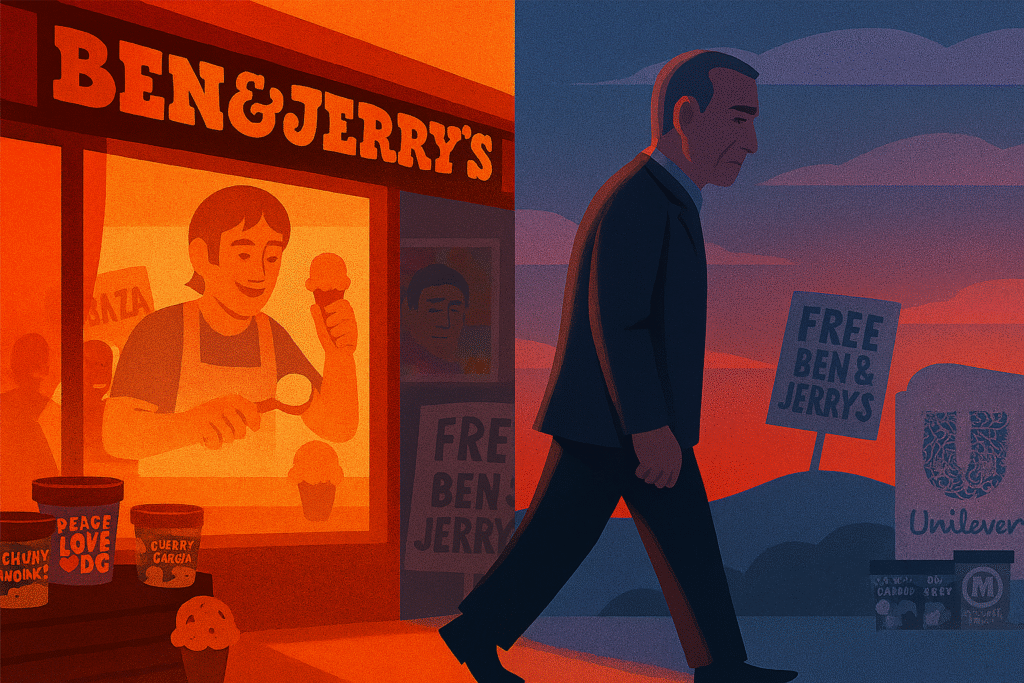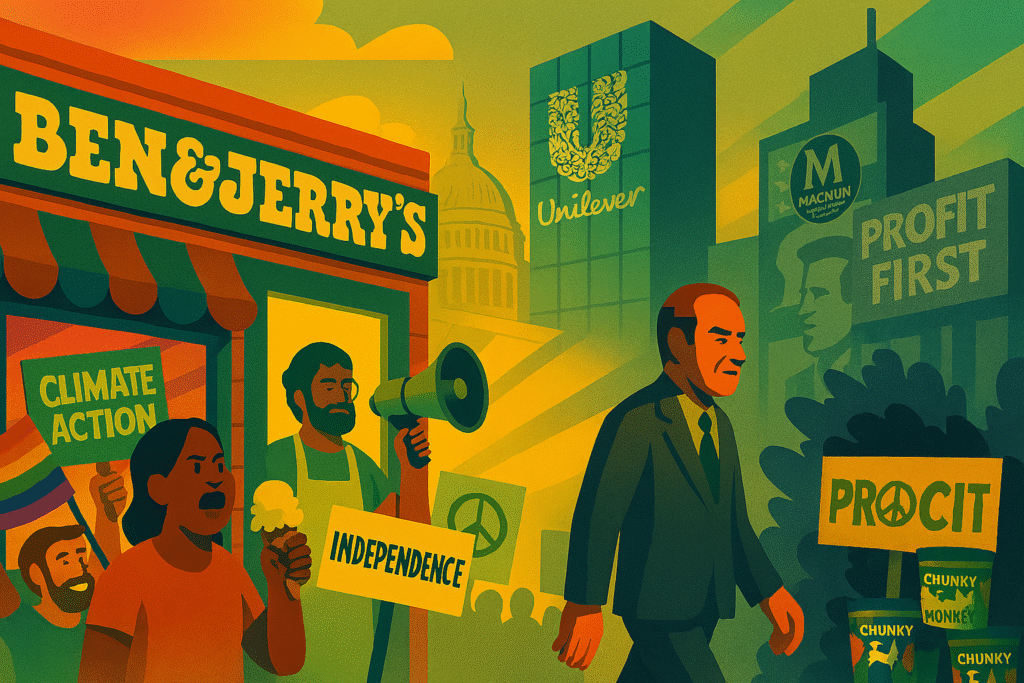Introduction
In the world of ice cream, few names evoke as much nostalgia and admiration as Ben and Jerry. These two childhood friends turned their passion for frozen treats into a global phenomenon, blending quirky flavors with bold social activism. But recent events have cast a shadow over this sweet success story. On September 17, 2025, Jerry Greenfield announced his resignation from Ben & Jerry’s, the company he co-founded nearly five decades ago. This move highlights deep-seated tensions with parent company Unilever, raising questions about the future of corporate social responsibility. As we dive into this saga, we’ll explore the history, the conflicts, and what it means for a brand built on values like peace, justice, and human rights.
The Humble Beginnings of an Ice Cream Empire

Ben Cohen and Jerry Greenfield met in junior high school in Merrick, New York, back in the 1960s. Both struggled with gym class, forging a friendship that would last a lifetime. After college, they pooled their savings, about $8,000, and took a correspondence course in ice cream making from Penn State University. In 1978, they opened their first scoop shop in a renovated gas station in Burlington, Vermont.
What started as a small operation quickly grew thanks to innovative flavors like Cherry Garcia and Chunky Monkey, inspired by pop culture and customer suggestions. But Ben and Jerry were never just about the ice cream. From the start, they infused their business with a sense of purpose. They sourced ingredients from local farmers, supported environmental causes, and donated a portion of profits to charities. This three-part mission, product quality, economic growth, and social impact, became the company’s guiding principle. They even wrote it horizontally in their mission statement to emphasize that all parts were equal.
By the 1990s, Ben & Jerry’s had become a household name, with sales topping $200 million. Yet, the founders remained committed to their roots, often speaking out on issues like climate change, LGBTQ+ rights, and racial justice.
The Unilever Acquisition: Promises of Independence

In 2000, Ben and Jerry made a pivotal decision. They sold their company to Unilever, a British-Dutch multinational, for $326 million. At the time, this seemed like a win-win. The deal included a unique merger agreement that protected Ben & Jerry’s independence. An independent board would oversee the social mission, ensuring the brand could continue its activism without interference from the parent company.
Greenfield and Cohen believed this setup would allow their values to endure. For over two decades, it mostly worked. Ben & Jerry’s continued to take stands, such as supporting marriage equality and protesting against fossil fuels. Unilever, known for brands like Dove and Lipton, appeared to embrace this progressive ethos.
However, cracks began to show in recent years. As Unilever faced pressure from investors focused on profits, the independence promised in the agreement started to erode. This set the stage for a series of public disputes that would test the founders’ resolve.
Rising Tensions: Clashes Over Activism and Independence

The conflicts escalated around 2021, when Ben & Jerry’s announced it would stop selling ice cream in Israeli settlements in the occupied West Bank and East Jerusalem. The company called this move consistent with its values, but it sparked backlash. Unilever responded by selling the Israeli business to a local licensee, overriding the founders’ objections.
This wasn’t an isolated incident. In 2022, tensions mounted further amid the war in Gaza. Ben & Jerry’s wanted to speak out in support of Palestinian refugees, but Unilever allegedly censored their statements. The founders accused the parent company of silencing the brand’s voice on human rights issues.
More disputes followed. In early 2025, Ben & Jerry’s sued Unilever, claiming it violated the merger agreement by removing CEO David Stever without board approval. Stever had been vocal on social media about progressive causes. The lawsuit also alleged that Unilever blocked posts criticizing former President Donald Trump and touching on topics like abortion, climate change, and universal healthcare.
Amid these battles, Unilever announced plans to spin off its ice cream division into a new entity called the Magnum Ice Cream Company. Set to go public in mid-November 2025, this move includes Ben & Jerry’s. However, the founders argue that Magnum, still tied to Unilever, won’t restore the brand’s autonomy. Cohen and Greenfield launched a “Free Ben & Jerry’s” campaign, urging a sale to socially aligned investors. They even proposed a buyout valued between $1.5 billion and $2.5 billion, but Unilever rejected it.
Adding to the drama, Cohen was arrested in May 2025 during a U.S. Senate protest against military aid to Israel and conditions in Gaza. He faced misdemeanor charges, underscoring the personal stakes in their activism.
Jerry Greenfield’s Heartbreaking Decision to Resign

For Jerry Greenfield, the ongoing conflicts became too much to bear. In his resignation letter, shared by Cohen on social media, Greenfield described the choice as one of the hardest he had ever made. After 47 years, he could no longer work for a company he felt had been “silenced” by Unilever. He lamented the loss of the independence enshrined in the 2000 agreement, which he and Cohen had carefully negotiated.
Cohen, speaking to media outlets like CNN and BBC, explained that Greenfield’s big heart was torn apart by the disputes. “Jerry felt like he had no choice but to resign,” Cohen said. While saddened, Greenfield also expressed relief at stepping away from the intense conflict.
Greenfield’s exit marks a poignant end to an era. As a brand ambassador, he had continued to embody the company’s spirit, but he refused to compromise his principles.
Ben Cohen’s Choice to Fight from Within

Unlike his partner, Ben Cohen has chosen to stay. He told Radio 4 that his heart leads him to advocate for the company’s independence from inside. Cohen accuses Unilever and now Magnum of usurping the independent board’s power and muzzling the social mission.
Cohen remains optimistic, viewing his role as a way to honor the values they built over 40 years. He continues to push for Ben & Jerry’s to be spun off independently, supported by investors who share their vision.
The Broader Context: Corporate Activism in a Polarized Era

This story unfolds against a backdrop of shifting corporate landscapes. With Donald Trump’s return to the White House in 2025, progressive activism faces new hurdles. Executive orders targeting Diversity, Equity, and Inclusion (DEI) programs, along with anti-DEI investment funds, have made companies wary of social stances.
Experts like Anna Macdonald from Aubrey Investments note that Ben & Jerry’s brand was built on irreverence and advocacy, but Unilever may have reined it in to avoid controversy, especially on sensitive topics like Israel and Gaza. Sam Fankuchen of Golden suggests corporate activism is maturing, focusing on measurable outcomes rather than bold statements.
In this environment, Ben & Jerry’s stands as a test case. Can a company maintain its soul under corporate ownership? Or will profit pressures silence voices like theirs?
Recommended Readings

For those interested in the full story behind Ben and Jerry, consider these books:
- “Ben & Jerry’s: The Inside Scoop” by Fred Lager: A detailed account of the company’s early days and growth, written by a former CEO.
- “Ice Cream Social: The Struggle for the Soul of Ben & Jerry’s” by Brad Edmondson: Explores the challenges of maintaining values after the Unilever sale.
- “Double-Dip: Lead with Values to Sweet Success” by Ben Cohen and Jerry Greenfield: The founders’ own insights on building a business with purpose.
FAQ

Q1: Why did Jerry Greenfield resign from Ben & Jerry’s?
A: Jerry Greenfield resigned because he believed Unilever had silenced the company’s social mission and eroded its independence, violating the 2000 merger agreement.
Q2: Is Ben Cohen also leaving the company?
A: No, Ben Cohen has decided to stay and advocate for the company’s values from within, hoping to restore its autonomy.
Q3: What is the “Free Ben & Jerry’s” campaign?
A: It’s an initiative by the founders to urge Unilever or Magnum to sell Ben & Jerry’s to socially aligned investors, allowing it to operate independently.
Q4: How has Unilever responded to the resignation?
A: Through Magnum Ice Cream Company, Unilever expressed gratitude to Greenfield but disagreed with his views, committing to the brand’s three-part mission.
Q5: What impact might this have on Ben & Jerry’s activism?
A: The disputes could limit future bold statements, especially in a politically charged climate, but the brand’s legacy of social engagement remains strong.
Conclusion

The departure of Jerry Greenfield from Ben & Jerry’s signals a turning point for a brand synonymous with fun and fairness. What began as a simple ice cream shop evolved into a symbol of business with a conscience, only to face challenges that tested its core. As Ben Cohen fights on and Magnum takes the reins, the future remains uncertain. Will Ben & Jerry’s reclaim its voice, or will this split dilute its legacy? One thing is clear: the story of Ben and Jerry reminds us that true success goes beyond scoops and sales; it’s about staying true to what you believe.




















Leave a Reply